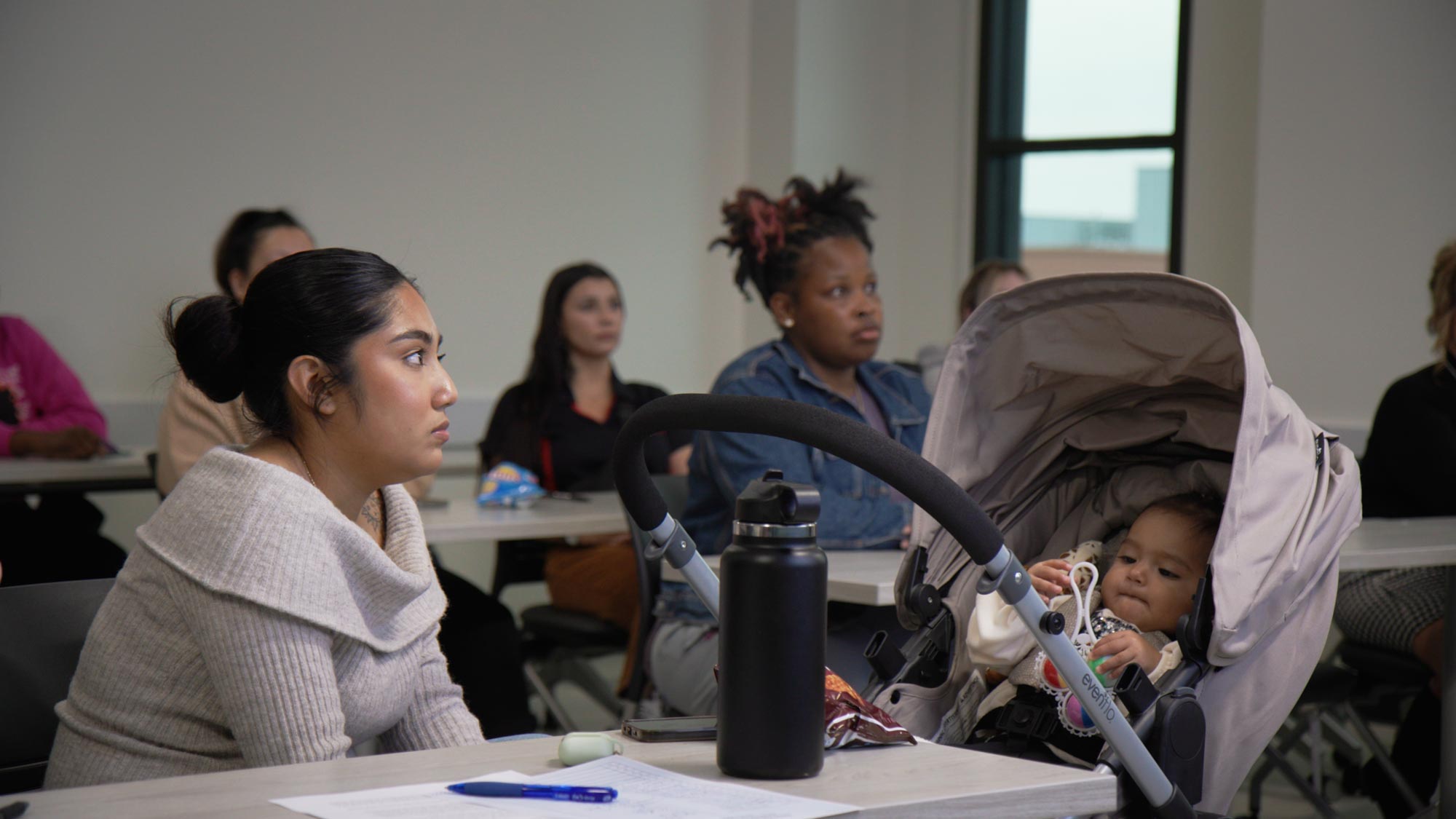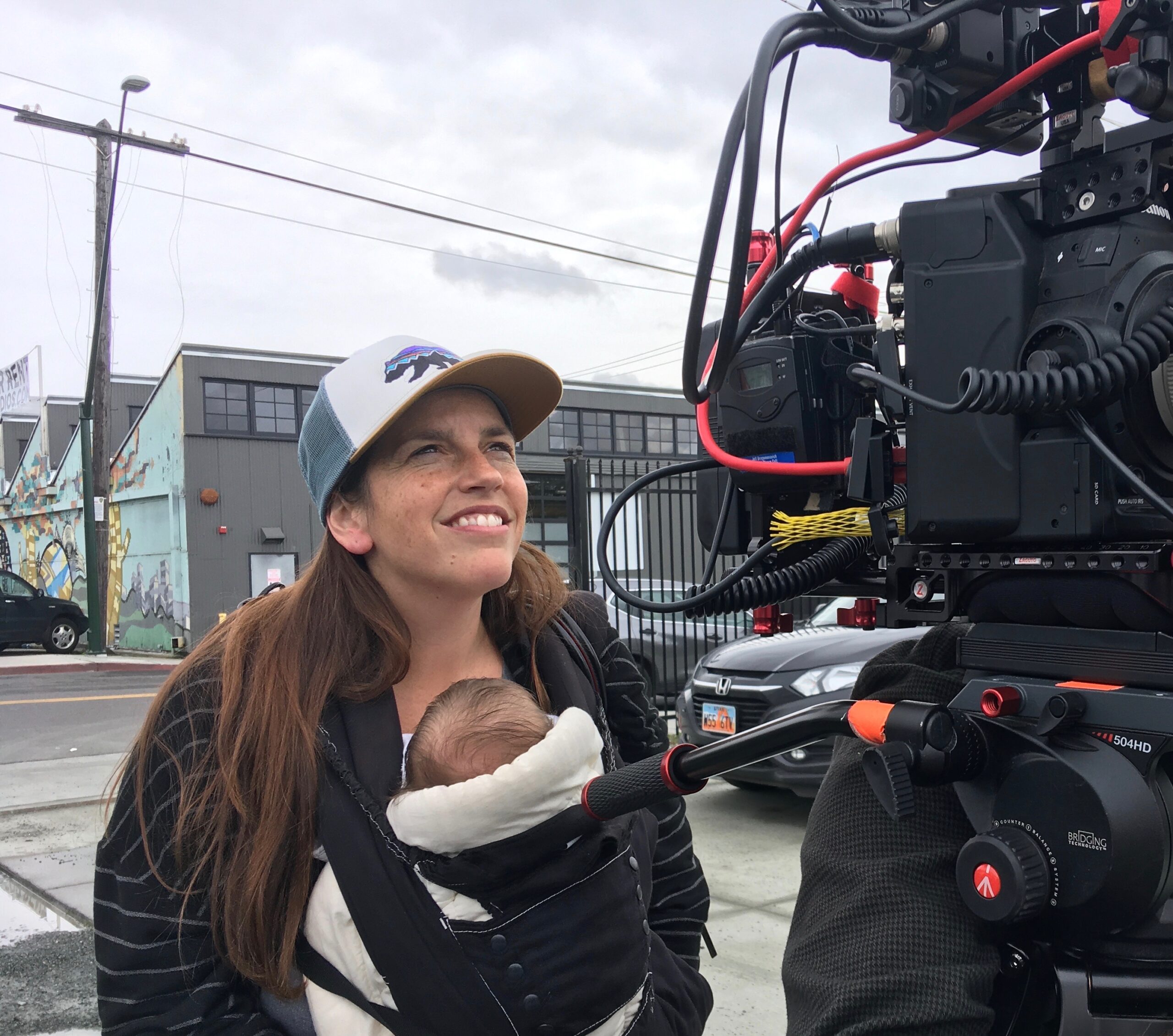Global 
‘Raising Up’ the Stories of Student Parents
Q&A with Jaye Fenderson, Three Frame Media, Director/Producer, “Raising Up”

Global 
Q&A with Jaye Fenderson, Three Frame Media, Director/Producer, “Raising Up”

One in five college students is a parent. Millions more adults have some college but no degree, often stopping out due to the significant time and financial constraints of navigating higher education while raising kids. Ensuring that parents have access to the postsecondary education and training they need has high generational stakes – when we invest in student parents, we invest in their future and their children’s.
Student parent success is key to unlocking solutions to many of our most pressing issues, including racial equity, child care, housing and workforce development, yet parents are often invisible to campus and community leaders – few institutions even ask the parenting status of their students.
Raising Up, a new 5-part short film series airing between Mother’s Day and Father’s Day 2024, aims to bring more visibility to the student parent experience. Imaginable Futures supported the production of the film series, along with Ascendium, College Futures Foundation, ECMC Foundation and Michelson 20MM Foundation. Presented by Ascend at the Aspen Institute, viewers can stream the series for free at raisingupstudentparents.com and on The Aspen Institute’s YouTube channel.
In advance of the film series premiere, Jaye Fenderson, co-founder of Three Frame Media and director/ producer of Raising Up, shared her insights on what makes student parents such powerful storytellers and the role of film in advancing better solutions.
A few years ago I met a young woman who was accepted to Columbia University at the same time that she learned she was pregnant. Because I had once worked as a Columbia University admissions officer, I offered to help her navigate the financial aid process. I was really surprised to learn that the institution didn’t offer much in the way of support – financial or otherwise – for pregnant students. As I began to research resources for this young woman, I realized it wasn’t just a Columbia University-specific issue but a challenge facing students at higher education institutions, nationally. At that time, little did I know that in fact, 1 in 5 students across the country are parenting.
Of course, my first instinct as a filmmaker was that the topic of student parents and the challenges, barriers and resource inequities they face would be a great subject for a documentary. As I started to conceptualize the docuseries, I could not help but reflect on my own experience as the daughter of two student parents, the resources I wished my parents had and the challenges our family encountered while my parents pursued their degrees. My own personal story as well as the experiences of my parents further inspired me to direct the series.
I originally set out to make a documentary following the young woman I met at Columbia and her journey to and through higher education, but I started to receive feedback that telling the story of one student parent wouldn’t reflect the myriad of student parent experiences and perspectives. I really took that to heart and began thinking about how we could tell the stories of a variety of student parents in a cinematic way, while also diving deeply into some of the issues and challenges a diverse cohort of student parents face as they navigate higher education.
A few years ago, my husband Adam and I directed “Saving Main” for American Express, and I loved how the short films were part of a larger series about the challenges that small businesses face, yet each shorter film was able to stand alone. With “Raising Up,” we wanted to use that same format, but have one film that connected all four students featured in each film and serve as a compelling opening for the entire series. The films can be watched either in succession or by topic, and with this “docuseries” format, we can continue to add stories and films that are long enough to be memorable, and yet easy to show at conferences or in classrooms or even at a Congressional hearing (hint, hint!) to inspire policy change.
Stories in all their forms have always played a powerful role in shaping culture and civilizations, and I think we are living in an exciting moment for storytelling. There is some great research out of Stanford University about the science of what makes people care, and (spoiler alert!) storytelling is one of the key factors. One Stanford professor Chip Heath found that 63% of people remember stories, while only 5% of people remember statistics. And according to Google Consumer Trends, content that is 10 minutes in length (or longer!) has a higher engagement rate than short form content. Documentaries, as a storytelling medium, can be particularly powerful because they give audiences an opportunity to enter into the lives of individuals in a very authentic and emotionally compelling way.
Films also create a reason for people to come together. When people come together, it’s an opportunity to discover something about themselves – as the individual viewer, and also as part of the community. Sometimes, this collective viewing experience inspires individuals to take action.
One of my favorite moments in the series is when Dr. Tina Cheuk shares how her lone voice was not enough to get attention from campus administrators, and it wasn’t until she got a group of five other student parents together that finally her campus started to make needed changes. We’ve had countless moments when we’ve been screening a film and afterwards people will approach us and say “I thought I was the only one experiencing this.” It is one of the most powerful aspects of documentary filmmaking: the stories we tell empower others to share their own experience or then take action to make a difference in their community.
Films create a reason for people to come together. When people come together, it’s an opportunity to discover something about themselves – as the individual viewer, and also as part of the community.
I really loved directing the Workforce film set in San Antonio. The short film tells the story of what can happen when an entire city comes together to solve an issue, but yet at the same time, how it can take years to see the real impact. So often I think we want to see immediate results and a ‘return on investment’ of resources, but real generational impact takes time. I love that this film gives a glimpse of what is possible, which is incredibly important to keep in mind when you’re in the trenches of trying to bring about change.
The life of a parent cannot be fully appreciated until you either become a parent yourself or spend some time caring for children. Imaginable Futures’ own Jenn Clark made a comment that has stuck with me throughout this project, which perfectly sums up the series. She said that “…student parents are jumping through 800 hoops a day.” Those hoops are going to be different every day for every parent, but it’s just the constant stress of having to incorporate the responsibilities as a caregiver while also balancing the demands of school and work.
I hope the films foster empathy for students who are pregnant or parenting. I think so often we design policies or systems without a picture in our minds of who is impacted by the decision and how that plays out in very real and practical terms. I really hope audiences encounter student parents through this series, that the challenges of student parents come to life along with some of the innovative solutions that are possible in support of student parents.
Ultimately I want the series to spur a collective urgency to “count” student parents. We need institutions of higher education and states to collect the data in order to allocate the resources needed to support student parents on their journey to and through higher education and into the workforce. We know that investment of resources – money, time, attention – is not only impacting current students but also future generations.
It is one of the most powerful aspects of documentary filmmaking: the stories we tell empower others to share their own experience or then take action to make a difference in their community.

JAYE FENDERSON is an award-winning director and producer with credits spanning feature-length documentaries, commercial & branded content, and acclaimed shows for ABC, NBC, FX, Lifetime, and MTV. A former admissions officer at Columbia University and passionate advocate for college access and success, Jaye has presented internationally at conferences, universities, and on Capitol Hill. The author of Seventeen’s Guide to Getting into College and a former college advice columnist for Seventeen.com, her writing has also appeared in Seventeen, Good Housekeeping, and The College Access & Opportunity Guide. Learn more about Three Frame Media, which also produced Unlikely and its accompanying student parent featurette Raising Dreams, created with support from Imaginable Futures in 2020.